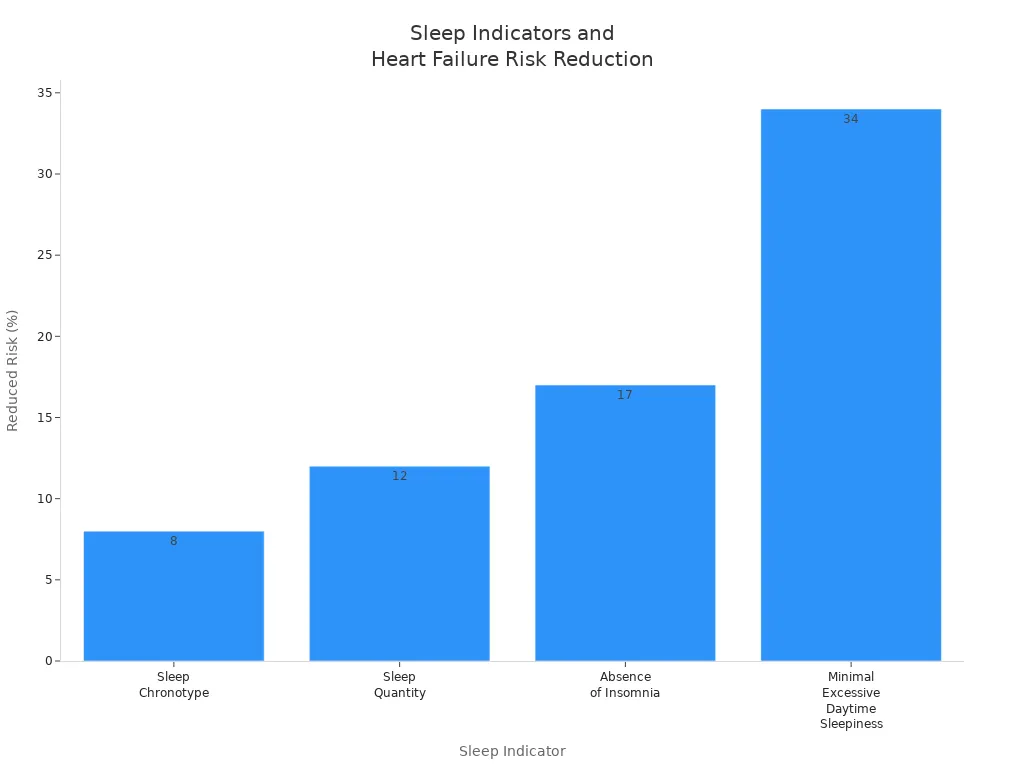
You can improve sleep quality and support a healthy sleep heart rate with just a few simple changes. Many adults struggle with sleep, and studies show poor sleep can raise your risk for heart problems. Paying attention to your sleep habits makes a big difference. Smart technology, like the Aura Ring by VERTU, lets you track your sleep and heart rate with impressive accuracy. Small, steady steps help you feel better and protect your heart every day.
Key Takeaways
-
Aim for 7 to 9 hours of quality sleep each night to keep your heart strong and healthy.
-
Keep a regular sleep schedule by going to bed and waking up at the same time every day.
-
Create a calm sleep environment with darkness, quiet, and comfortable bedding to improve rest.
-
Limit caffeine and heavy meals before bedtime to help your body relax and fall asleep faster.
-
Use smart devices like the Aura Ring to track your sleep and heart rate for better health insights.
Sleep and Heart Health
Why Sleep Matters
You might not realize how much sleep affects your body. When you get good-quality sleep, your heart gets a chance to rest and recover. The American Heart Association says adults should aim for 7 to 9 hours of sleep each night. This amount helps your heart stay strong and healthy. If you sleep less than 7 hours or more than 9 hours, your risk for heart problems goes up.
Poor sleep can lead to high blood pressure, heart attacks, and even stroke. If you wake up often during the night or have trouble falling asleep, your heart may work harder than it should. Sleep deprivation can also make you feel tired during the day, which puts extra stress on your heart.
Here are some ways sleep quality links to heart health:
-
Not enough or too much sleep increases the risk of heart disease and stroke.
-
Waking up often or having sleep apnea raises your chance of heart attack and high blood pressure.
-
Going to bed late can lead to weight gain and higher blood pressure.
-
Feeling unhappy with your sleep can cause heart problems.
-
Irregular sleep patterns make heart disease and inflammation more likely.
Heart Health Basics
Your heart works best when you take care of your sleep. There is a strong connection between sleep and heart health. When you improve sleep quality, you help your heart stay healthy. Poor sleep can cause problems like obesity, high blood pressure, and diabetes. These issues make your heart work harder.
|
الوصف |
Associated Heart Health Impact |
|
|---|---|---|
|
Sleep Chronotype |
Being a “morning person” |
8% reduced risk of heart failure |
|
Sleep Quantity |
7-8 hours of sleep per night |
12% reduced risk of heart failure |
|
Absence of Insomnia |
Rarely experiencing insomnia |
17% reduced risk of heart failure |
|
Minimal Excessive Daytime Sleepiness |
Rarely experiencing excessive daytime drowsiness |
34% reduced risk of heart failure |

If you want to improve sleep quality, start by making small changes. Try to go to bed and wake up at the same time every day. Avoid things that make it hard to sleep, like caffeine or heavy meals before bed. When you focus on sleep and heart health, you give your body the best chance to stay strong. Remember, sleep deprivation can hurt your heart, but you can take steps to protect it.
Sleep Schedule
Consistency Every Day
You might not realize how much a regular sleep schedule can help you sleep better and feel more rested. When you go to bed and wake up at the same time every day, your body learns when it’s time to rest and when it’s time to get up. This simple habit helps your body’s internal clock work smoothly. Even on weekends, sticking to your usual times makes a big difference.
Here’s a quick look at why consistency matters:
|
Aspect |
What Happens |
Why It Matters |
|---|---|---|
|
Irregular bedtimes |
You may feel tired during the day and have trouble falling asleep. |
Your heart rate can stay higher, and your sleep quality drops. |
|
Late nights |
Your resting heart rate goes up, and you may not get good-quality sleep. |
Your heart doesn’t get the full rest it needs. |
|
Regular schedule |
Your heart rate stays steady, and you feel more refreshed. |
You support your heart and overall health. |
Try to keep your bedtime and wake-up time steady. This helps your heart rate stay stable and supports better sleep.
Tip: If you have trouble sticking to a schedule, set a gentle alarm or reminder to start winding down each night.
Bedtime Routine
A consistent bedtime routine helps your mind and body get ready for sleep. You can start by winding down an hour before bed. Choose calming activities like reading, journaling, or taking a warm bath. Keep your lights dim and avoid screens, such as phones or TVs, during this time. This helps your brain know it’s almost time to sleep.
Here are some easy steps for a relaxing routine:
-
Brush your teeth and wash your face in the same order each night.
-
Try gentle stretches or deep breathing.
-
Keep your bedroom cool and dark.
-
Avoid eating or drinking close to bedtime.
-
Skip caffeine and alcohol in the evening.
A good-quality sleep starts with a calm mind and a comfortable space. When you follow a consistent bedtime routine, you train your body to sleep better every night.
Sleep Environment

Comfort and Darkness
You might not realize how much your sleep environment shapes the way you rest. A comfortable bedroom helps you fall asleep faster and wake up feeling refreshed. The microclimate under your bedding matters more than the room temperature itself. If your blankets and sheets keep you cozy but not too hot, you’ll likely sleep better. Good ventilation in your room also makes a big difference. Fresh air helps you breathe easier and can improve your sleep quality.
Here are some simple ways to create a relaxing sleep environment:
-
Choose bedding that feels soft and keeps you at the right temperature.
-
Open a window or use a fan to keep the air fresh.
-
Adjust your blankets if you feel too warm or too cold at night.
Darkness is just as important. Your body needs darkness to make melatonin, the hormone that helps you fall asleep. Bright lights in the evening can trick your brain into thinking it’s still daytime. Try using blackout curtains or an eye mask to block out light. Keep your room dim about two hours before bedtime. This helps your body get ready for sleep and makes it easier to drift off.
Tip: Turn off bright screens and dim the lights in your home before bed. Your body will thank you!
Reduce Noise
Noise can sneak into your bedroom and disturb your sleep. Even sounds you barely notice can keep your brain alert and make it harder to rest. Studies show that loud or low-frequency noise can lower your heart rate variability, which means your heart has to work harder. Over time, this can affect your heart health.
You can take steps to make your room quieter:
-
Use earplugs or a white noise machine to block out sounds.
-
Close windows if there’s traffic or street noise outside.
-
Place soft rugs or curtains in your room to absorb sound.
Some people find that gentle background noise, like a fan or white noise, helps them sleep better. This can mask sudden sounds that might wake you up. A quiet, peaceful room supports deep sleep and helps your heart stay healthy.
Sleep Hygiene Practices
Limit Stimulants
You might love a cup of coffee in the morning, but did you know that caffeine and other stimulants can mess with your sleep? Caffeine blocks adenosine, a chemical that helps you feel sleepy. When you drink coffee, tea, or energy drinks late in the day, you may find it harder to fall asleep at night. Even if you think you have built up a tolerance, caffeine can still raise your heart rate and delay sleep.
Here’s what happens when you don’t limit stimulants:
-
You take longer to fall asleep.
-
Your total sleep time drops.
-
Your heart rate may stay higher than normal.
-
You might wake up feeling tired.
Try to avoid caffeine at least six hours before bedtime. If you want a warm drink in the evening, choose herbal tea or warm milk instead. This small change can help your body make more melatonin, which is the hormone that tells your brain it’s time to sleep.
Tip: Watch out for hidden caffeine in chocolate, soda, and some pain relievers.
Avoid Heavy Meals
Eating a big meal right before bed can make it tough to get good sleep. Heavy or oily foods slow down your digestion and can keep you awake longer. You might notice that you toss and turn or wake up more often during the night. For some people, late-night eating can even lower sleep quality and make it harder for your body to produce melatonin.
Here’s what can happen if you eat heavy meals late:
-
You spend more time trying to fall asleep.
-
You get less REM sleep, which is important for feeling rested.
-
Your sleep gets broken up, especially if you have sleep apnea.
-
You may feel groggy in the morning.
Try to eat your last meal two to three hours before bedtime. Choose lighter foods that are easy to digest. This helps your body relax and lets melatonin do its job, so you can drift off more easily.
Note: Good sleep hygiene practices, like limiting stimulants and avoiding heavy meals, make a big difference in how well you sleep each night.
Relaxation for Better Sleep
Deep Breathing
You might feel tense after a busy day. Deep breathing can help you relax and prepare for sleep. When you take slow, deep breaths, you send a signal to your body that it is time to calm down. This simple practice helps you manage stress and lower your heart rate. Many people find that deep breathing makes it easier to fall asleep and wake up feeling refreshed.
Here is what some clinical trials found about deep breathing and sleep:
|
Study Group |
Breathing Practice |
Results for Sleep and Stress |
|---|---|---|
|
151 nurses |
Diaphragmatic breathing, 20 min/day |
Better sleep quality, less anxiety |
|
40 patients |
Mindful breathing + therapy |
Improved insomnia treatment |
|
60 patients |
Deep breathing after radiation |
Higher sleep quality |
|
22 with chronic low back pain |
Diaphragmatic breathing + exercise |
Better sleep quality |
Deep breathing works by increasing the activity of your parasympathetic nervous system. This helps your body slow down, reduces stress, and lowers your heart rate. You can try this: Breathe in slowly through your nose, hold for a few seconds, then breathe out gently through your mouth. Repeat for a few minutes before bed.
Tip: Practice deep breathing every night to help your body relax and sleep better.
Gentle Stretching
Gentle stretching is another great way to relax before bed. When you stretch, you help your muscles let go of tension from the day. This makes it easier for your body to shift from being active to resting. Stretching also improves blood flow and helps you feel less stress.
Research shows that static stretching before bedtime can lower stress hormones and boost your mood. People who stretch at night often say they fall asleep faster and wake up less during the night. Physical therapists suggest spending about 10 minutes on gentle stretches, 30 to 60 minutes before you go to bed. Try to move slowly and avoid any pain. You can combine stretching with deep breathing for even more relaxation.
Note: Gentle stretching helps you manage stress and prepares your body for restful sleep.
Healthy Sleep Heart Rate

Monitor with Smart Devices
You might wonder how you can keep track of your healthy sleep heart rate each night. Smart devices like the Aura Ring by VERTU make this easy and comfortable. The Aura Ring fits like a second skin and uses advanced AI to monitor your heart and sleep patterns while you rest. You just wear it, and it quietly collects data about your heart rate, sleep stages, and even your blood oxygen levels.
Most healthy adults have a healthy sleep heart rate between 50 and 70 beats per minute. This number is lower than your daytime heart rate because your body relaxes during sleep. The Aura Ring gives you clear, personalized insights through its app, so you can see if your heart rate stays in the healthy range. If you notice your healthy sleep heart rate is often above 70, it could be a sign to pay closer attention to your heart health.
Continuous monitoring helps you spot changes early. The Aura Ring tracks your trends over time, so you can see if your healthy sleep heart rate starts to rise or fall. This early warning lets you take action before small problems become big ones. You can use this information to maintain healthy heart health and improve your sleep habits.
Tip: Check your weekly wellness report in the Aura app to see how your healthy sleep heart rate changes over time.
Recognize Warning Signs
Sometimes, your heart may send signals that something is wrong during sleep. You should watch for these warning signs:
-
Your heart feels like it is racing, pounding, or fluttering.
-
You notice skipped or extra beats.
-
Your healthy sleep heart rate goes above 100 beats per minute.
-
You feel chest pain, shortness of breath, or dizziness at night.
If you see these signs, talk to a doctor. These symptoms can point to problems like arrhythmia, sleep apnea, or other heart issues. Early action keeps your heart strong and helps you sleep better.
Diet and Exercise for Heart Health
Balanced Meals
You might wonder how your food choices affect your sleep and your heart. Eating a variety of healthy foods helps you feel better and keeps your heart working smoothly. When you follow heart-healthy diet strategies, you support balanced nutrition and sleep hygiene at the same time. Many studies show that certain diets can help you sleep better and lower your risk of heart problems.
Here are some simple tips for building a balanced meal:
-
Choose fruits and vegetables every day. These foods give you vitamins and fiber.
-
Pick whole grains like brown rice, oats, or whole wheat bread.
-
Add fatty fish, such as salmon or tuna, for omega-3 fatty acids.
-
Include nuts and legumes for protein and healthy fats.
-
Try foods rich in magnesium and vitamin D, like leafy greens and eggs.
-
Eat berries and tart cherries, which may help your sleep-wake cycle.
-
Avoid foods high in saturated fats, refined sugars, and excess salt.
-
Skip caffeine and alcohol close to bedtime.
Diets like the Mediterranean, DASH, and plant-based plans focus on these foods. They help you keep your heart strong and improve sleep quality. You can make small changes, like swapping soda for water or adding an extra serving of vegetables to your dinner.
Tip: Plan your meals ahead of time. This makes it easier to choose healthy options and avoid late-night snacking.
Regular Activity
Moving your body every day helps your heart and improves your sleep. Regular exercise keeps your heart rate steady and lowers stress. You do not need to run a marathon. Simple activities work well.
Here is a quick guide to recommended exercise:
|
Activity Type |
How Much? |
Examples |
|---|---|---|
|
Moderate Aerobic |
Brisk walking, dancing, biking |
|
|
Vigorous Aerobic |
75 minutes per week |
Running, swimming, singles tennis |
|
Muscle-Strengthening |
2 days per week |
Lifting weights, yoga, gardening |
You can split your exercise into short sessions. Try brisk walking for 30 minutes most days. Dancing, gardening, or biking also count. Resistance training, like lifting weights or doing yoga, helps your muscles and supports your heart. Both aerobic and strength exercises make it easier to fall asleep and wake up refreshed.
Note: You can exercise at any time of day. Evening workouts do not usually harm your sleep. Just listen to your body and find what works best for you.
Regular exercise and balanced meals work together to keep your heart healthy and help you sleep well. Small steps each day add up to big changes over time.
Light Exposure and Sleep
Morning Sunlight
Getting outside in the morning can do wonders for your body and mind. When you step into the sunlight soon after waking up, you help set your internal clock for the day. This simple habit makes it easier to feel alert in the morning and sleepy at night. Here’s what happens when you soak up that early light:
-
Morning sunlight boosts your cortisol levels, which helps you wake up and feel ready for the day.
-
Your body’s circadian clock gets a clear signal, so you feel sleepy at the right time later.
-
Just 5-10 minutes of sunlight on a sunny day, or a bit longer if it’s cloudy, is enough.
-
Skip sunglasses or blue light blockers during this time to get the full benefit.
-
Morning light stops melatonin production, so you feel awake, and it helps your body know when to start making melatonin again at night.
-
This routine can even help with hunger and body temperature, making your whole day run smoother.
You might notice you fall asleep faster and feel more rested when you make morning sunlight a habit. Try to get outside as soon as you can after waking up—even a short walk helps!
Tip: Afternoon sunlight also helps your body stay on track, but morning light is the most important for your sleep-wake cycle.
Limit Evening Light
Bright lights in the evening can trick your brain into thinking it’s still daytime. When you use screens or sit under strong lights before bed, your body delays making melatonin. This hormone helps you feel sleepy. Studies show that high levels of blue light from screens or lamps at night can make it harder to fall asleep and keep you alert when you want to wind down. People who limit bright light in the evening fall asleep faster and have better sleep quality.
If you want to sleep well, try these simple steps:
-
Dim the lights in your home about an hour before bed.
-
Avoid screens like phones, tablets, or TVs close to bedtime.
-
Use warm, soft lighting in the evening.
Your body needs darkness to start making melatonin. When you give yourself a break from bright lights at night, you help your body get ready for restful sleep.
When to Seek Help
Sleep Disorders
You might wonder when poor sleep becomes more than just a bad night. Some sleep problems can hurt your heart over time. Obstructive sleep apnea (OSA) is one of the most common sleep disorders that affects heart health. OSA happens when your throat muscles relax and block your airway during sleep. You may snore loudly, stop breathing for short periods, or wake up feeling tired. Many people with OSA also notice morning headaches or daytime sleepiness.
Untreated sleep apnea can raise your risk for high blood pressure, heart rhythm problems, heart failure, and stroke. OSA increases the risk of heart failure by 140%, stroke by 60%, and coronary artery disease by 30%. If you notice signs like loud snoring, breathing pauses, or poor sleep every night, you should talk to your doctor. Treatments such as CPAP therapy, weight loss, or changing your sleeping position can help lower these risks.
Other sleep disorders, like insomnia, also cause poor sleep and can lead to heart problems. Chronic sleep deprivation raises blood pressure, increases stress hormones, and can make you gain weight. These changes put extra strain on your heart.
Tip: If you feel tired all day, wake up often at night, or notice changes in your breathing, keep a sleep diary. Share it with your healthcare provider.
Medical Advice
You should not ignore changes in your heart rate or sleep patterns. If your heart rate feels too fast or slow, or you notice weakness, dizziness, or fainting, let your healthcare provider know. Sudden changes in heart rate with chest pain, shortness of breath, or fainting mean you should call 911 right away.
Regular heart rate tracking helps your doctor decide if you need medicine changes or other treatments. If you take beta blockers, log your heart rate as your doctor recommends. You can use smart devices to track your heart rate and sleep, then share the results with your healthcare team.
To support your heart and sleep, keep a steady sleep schedule, get morning sunlight, and avoid heavy meals before bed. Make your bedroom cool, dark, and quiet. If you have trouble sleeping or notice poor sleep often, work with your doctor to find solutions.
Note: Getting help early protects your heart and helps you sleep better.
You can protect your heart by sticking to a regular sleep schedule, eating healthy foods, and moving your body every day. Research shows that even small changes, like relaxing before bed or limiting screen time, help lower your risk for heart disease. Tracking your progress with the Aura Ring gives you clear feedback and helps you stay motivated. Treat sleep as a top priority. Start with one new habit tonight and watch your heart health improve.
التعليمات
How can I tell if my sleep is good for my heart?
You can check how rested you feel in the morning. If you wake up refreshed and have steady energy, your sleep likely supports your heart. Devices like the Aura Ring help you track your sleep and heart rate for extra insight.
What is a healthy sleep heart rate?
Most healthy adults have a sleep heart rate between 50 and 70 beats per minute. If your heart rate stays in this range while you sleep, your heart gets the rest it needs. The Aura Ring can show you your average sleep heart rate each night.
Can the Aura Ring help me improve my sleep?
Yes! The Aura Ring tracks your sleep patterns and heart rate. You get easy-to-read reports and tips in the app. These insights help you spot trends and make changes for better sleep and heart health.
What should I do if I notice my heart rate is high at night?
If your heart rate often feels high at night, try relaxing before bed and avoid caffeine. If it stays high or you feel chest pain, talk to your doctor. The Aura Ring can help you notice these changes early.







